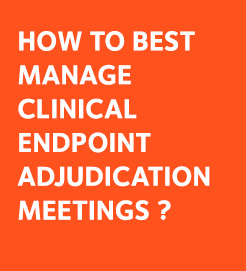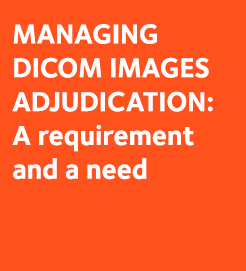Planning a new clinical study is a long and complex process. The larger the study, the higher the complexity and the cost. Many months can pass from the time of protocol concept until the first patient is enrolled and although planning the medical part may be complex and technical, it’s the financial steps that take up the longest time. Contracts must be written and reviewed by lawyers from all parties, budgets must be set and approved by management. Last minute pushbacks can derail the planning and poor contracts can cost a lot more than forecasted. Here are 10 critical steps for budgeting one part of your study, the clinical endpoint adjudication by an independent review committee.
Step 1 - Determine whether you need to set up adjudication of clinical endpoints, adverse events or other study criteria by an independent expert committee. Not all studies need this step and if you can avoid it without compromising the validity of the results, go for it. It will be one less thing to worry about. But if adjudication was requested by regulatory authorities or suggested by the Steering Committee of the study, there is no way out, you must set it up and, in that case, better do it right.Step 2 - Know your experts: choosing the right members for an adjudication committee is not a trivial exercise. Reviewers must be chosen for their medical expertise but must also be trusted to be available when adjudication is needed and be good team players if you want to keep tie-breaking meetings (and their added cost) to a minimum. Each expert must be evaluated for their recognition (global, regional, local) based on academic degrees, publications and current position. They cannot take part in the study as investigators and must not have financial ties to the sponsor.
Step 3 - Calculate fair market value for payments. Compliance rules have become very strict and require payments to be within strictly prescribed limits for each country. Liaise with your compliance officer to calculate the foreseen workload and the hourly rates for each expert based on their location, level of recognition and study requirements. Include meetings, preparatory or off-line work and travel costs. Make sure to obtain formal, written approval before proceeding to contract preparation or even price negotiations. You could be unpleasantly surprised and have to pull back from promises if you do not have approval secured upfront. You want to start on a positive note with your experts.
Step 4 - Prepare the committee charter. Do not hesitate to include as many details and as many options as needed in the adjudication charter. The charter is not only the guide for performing the work during the study but also the reference document in case of disagreement during adjudication and at the end of the process. A clear definition of responsibilities, tasks and workload can save you a lot of discussions and stress when time comes for making payments and closing counts.
Step 5 - Choose your vendor. You may think that all vendors are alike and that the procurement department has only chosen the most performing companies to work with so the choice will be an easy pick. This is indeed the intent at least in companies with a list of preferred vendors but an upfront pre-selection can only eliminate those companies that appear unfit for a certain task. It can certainly not tell you which is the right one for your project. Overall criteria are different from specific requirements so look closely to the available vendors and choose wisely. While size and multi-task may be strengths at the corporate level, flexibility, trust and good communication is what you should look for at the project level.
Step 6 - Study the costing model. You will learn a lot and could be surprised. Costing models can be very deceptive. They are usually created by highly skilled professionals and may look much better than they really are. Look for the small print. Look for exceptions and deviations from the mainstream plan. A huge cost can be hiding in the overload, the extra work, the unscheduled tasks. Ask to see their SOPs and don’t hesitate to ask questions during the negotiation phase. And don’t forget the validation, training and support parts.
Step 7 - Secure budget. You now have all the elements in hand to approach management with a budget proposal. You can be sure to receive questions and pushbacks. The needs are always higher than expected and if they are not, there is a problem somewhere. Most of the time there are hidden costs that will show along the way. Make sure that you have all the answers and some room for compromise. Endpoint adjudication may appear to be a luxury that will work as adjusting factor for cost. Don’t let that happen.
Step 8 - Prepare the contracts. Now that the main elements have been defined, you can proceed to drafting the contracts. Remember that the members of the committee may have different responsibilities and they will certainly have different hourly rates. Sponsors usually have contract templates that already contain the standard clauses and can be adapted to different situations by referring to a work order in the appendices for the specific elements of the work to be done. Make sure that your legal department has provided you with the correct template and approves the final contract before proceeding to signatures. Contracts must be as flexible as possible to accommodate for changes in the nature or the amount of work.
Step 9 - Look for the unforeseen. As in many other cases, the devil is in the detail. There is a million reasons why a clinical trial can be delayed, expanded, changed, extended... Having to redo contracts or re-negotiate prices and costs is the last thing you need in the middle of the “battle”. Provisions must be made for easy extensions of the contracts without the need to repeat the administrative steps. Many times, the cost remains constant but work is postponed. In other cases, only part of the requested work had to be done but another task emerged.
Step 10 - Keep track of the work done along the way. Clinical trials can last very long and invoices tend to come in the end. It may prove difficult to know who did what and you may find yourself relying on the other party’s word for payments.







